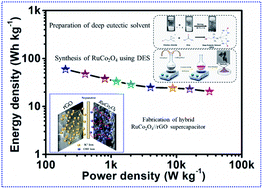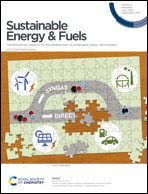Deep eutectic solvent-assisted synthesis of RuCo2O4: an efficient positive electrode for hybrid supercapacitors
Abstract
Bimetallic oxides attract significant interest for application in supercapacitors because of their multivalent active sites, which render them highly efficient materials. Herein, we develop a new approach for the synthesis of a bimetallic oxide using a choline chloride and urea (1 : 2)-based deep eutectic solvent. We synthesize a unique amorphous nanofibrous network of RuCo2O4 with an effective surface area of 245 m2 g−1. By virtue of nanofibrous networks, amorphous behavior and high surface area, RuCo2O4 exhibits a superior specific capacity of 372 mA h g−1 at 3.3 A g−1 with an excellent rate capability (55% after 41 A g−1) and cycling stability (94% after 10 000 cycles). Additionally, an aqueous hybrid supercapacitor cell is fabricated using RuCo2O4 and reduced graphene oxide as a positive and negative electrode, respectively. The proposed RuCo2O4//rGO hybrid supercapacitor cell demonstrates an extended potential window of 1.4 V with an excellent energy density of 59.7 W h kg−1.



 Please wait while we load your content...
Please wait while we load your content...